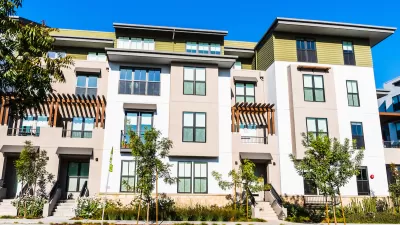If the rent is too damn high, it might still be a good investment.

A working paper published recently by the National Bureau of Economic Research offers reason for optimism for renters paying high costs to live in desirable neighborhoods: that rent premium is a good investment that pays back in job opportunities, quality education, and cultural enmities.
Laura Bliss shares the news of the paper, authored by Esteban Rossi-Hansberg and Adrien Bilal, a Princeton University economics professor and Ph.D student, respectively. Here's how Bliss explains the big conclusion for renters who might feel disheartened by the cost of living in high-demand neighborhoods:
So, when you choose to move to a pricier and amenity-laden city, you’re transferring resources into the future—i.e., saving!—by establishing yourself near opportunities for higher pay and human capital, Rossi-Hansberg and Bilal argue. On the flipside, when you relocate to a community with a lower cost of living but fewer economic advantages, you’re pulling resources into the present that you might have gained in the future—i.e., borrowing.
Bliss notes that the study comes with the caveats that not everyone can afford to make those kinds of investment into the future.
"But, Rossi-Hansberg and Bilal hypothesize, if your location is an asset, it can also be 'sold' when you need the income," explains Bliss. "In other words, if you’ve just lost your job or been hit with a big bill, you can cash in your location by moving to a less-premium one." As detailed in the article, the paper presents evidence that individuals at lower income levels were more likely to "trade in" locations.
FULL STORY: If Location Is an Asset, High Rent Is ‘Saving’ for the Future

Planetizen Federal Action Tracker
A weekly monitor of how Trump’s orders and actions are impacting planners and planning in America.

San Francisco's School District Spent $105M To Build Affordable Housing for Teachers — And That's Just the Beginning
SFUSD joins a growing list of school districts using their land holdings to address housing affordability challenges faced by their own employees.

The Tiny, Adorable $7,000 Car Turning Japan Onto EVs
The single seat Mibot charges from a regular plug as quickly as an iPad, and is about half the price of an average EV.

Seattle's Plan for Adopting Driverless Cars
Equity, safety, accessibility and affordability are front of mind as the city prepares for robotaxis and other autonomous vehicles.

As Trump Phases Out FEMA, Is It Time to Flee the Floodplains?
With less federal funding available for disaster relief efforts, the need to relocate at-risk communities is more urgent than ever.

With Protected Lanes, 460% More People Commute by Bike
For those needing more ammo, more data proving what we already knew is here.
Urban Design for Planners 1: Software Tools
This six-course series explores essential urban design concepts using open source software and equips planners with the tools they need to participate fully in the urban design process.
Planning for Universal Design
Learn the tools for implementing Universal Design in planning regulations.
Smith Gee Studio
City of Charlotte
City of Camden Redevelopment Agency
City of Astoria
Transportation Research & Education Center (TREC) at Portland State University
US High Speed Rail Association
City of Camden Redevelopment Agency
Municipality of Princeton (NJ)





























